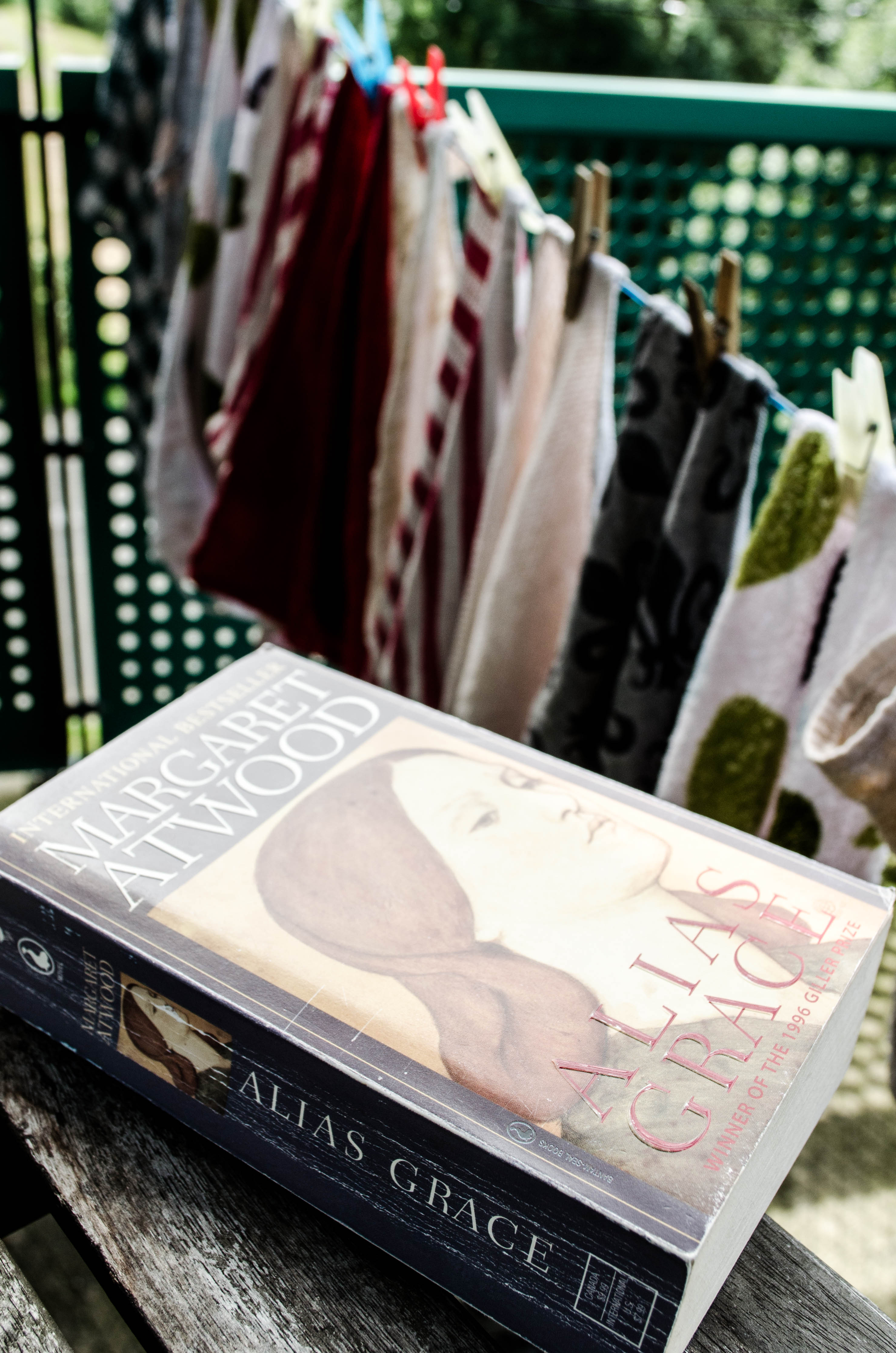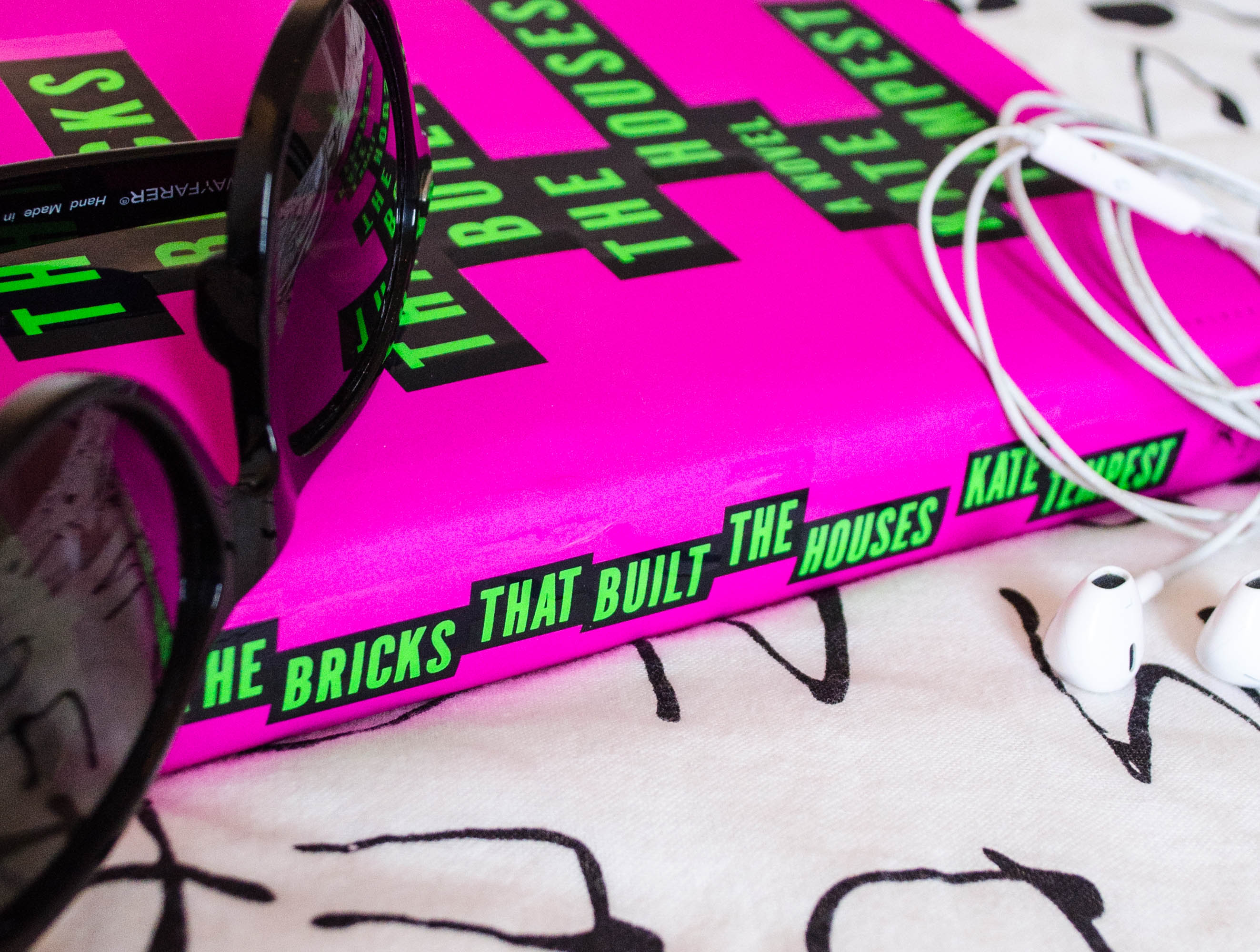Just finished
 Alias Grace
Alias Grace by Margaret Atwood
Grace Marks was a real person, a maid convicted of the murder of her employer, Thomas Kinnear, in 1843. She was originally sentenced to death but ended up in an insane asylum, briefly, before spending 30 years in prison and eventually being pardoned. When I was reading this book last week, I expressed my hope that the book would reveal Grace’s guilt. I still think she did it, but the book takes careful pains to leave room for doubt (and spirit possession). Alias Grace moves back and forth in time as Grace recounts her story to psychologist Simon Jordan, and the most interesting parts of the book take place in present time when Jordan’s behavior and inner thoughts reveal him to be just as much – if not more – of a creepy potential psychopath as Grace. Sometimes Jordan passes off his violent and misogynistic impulses as fleeting thoughts that shouldn’t be any cause for concern, but, as he gets dragged deeper into Grace’s story and life, he loses (cedes?) control and his actions start sliding to meet his dark thoughts. The power play between Grace and Dr Jordan was interesting to read, and when the story starts to follow Grace more closely in the past – leading up to the climactic killing of Thomas Kinnear and his mistress/housekeeper Nancy Montgomery – the sticky, one-sided sexual tension between them loses some of its taughtness and backs away from the edge of the really creepy shit, to the detriment of the book as a whole, I think. That the relationship between Dr Jordan and his “subject” is creepier and darker than the events surrounding the murder that he’s trying to investigate is at the core of the book. Dr Jordan likes his women weepy, fragile and reluctant, and Grace proves to be a tough nut to crack. The back and forth between them – coy and candid, sane and delusional, gauzy dreams and stark reality – is weird and fascinating. I read recently that Sarah Polley is making a mini-series based on the book for the CBC, and I’m really looking forward to seeing how well the atmospheric tension translates to TV.
 The Bricks that Built the Houses
The Bricks that Built the Houses by Kate Tempest
Some parts of TBTBTH read like poems. Others, like a Guy Ritchie screenplay. Still others like a really dark episode of Parenthood or Shameless. The tone is a bit all over the place and isn’t quite moody or driven enough by a sense of place to properly balance the feeling you’re left with at the end of the book, which is a nihilistic perspective that nothing changes and it’s all pointless anyway. So what was the point? No one is particularly likeable, especially not the men, but an interesting love triangle starts to form. Before too long, though, the author gives us totally unnecessary paragraphs of backstory and hacky points of connection between all of the characters until there are so many outshoots from the original triangle that it collapses in on itself like an overwrought Erector Set. What kept me moving through the book, though, were the truly beautiful and brilliant bits of poetic imagery that Tempest tosses in seemingly with ease, describing exactly what it’s like to be and feel human with bizarre, unique and heartbreakingly precise physical manifestations of emotions.
“Becky leans in and kisses Harry’s cheek slowly, close to the mouth. Half her lips touch Becky’s like it’s no big deal. Harry’s face is on fire, the flames are rising and obscuring her view. She tries to act natural.
‘See you later then,’ she says, keeping her tone as bubbly as she can, aware of the sphinx-like gaze of Gloria, wondering if somehow Gloria can see the flames that are engulfing her head.
‘Yeah,’ Becky says, looking back over her shoulder, already walking away. ‘Bye, Harry…’ and Harry’s sure that was a wink she gave her. A dark flash of lips and winking eyes. She stands, stunned, watching until she loses them in the bodies. A slim wrist reaches out and grabs a wine bottle from the bar, sparkling bracelet flashing beneath the lighting, and then they’re gone.
She breathes fast and shallow. Pats the flames down with quick hands. The embers crackle. She goes to touch the earlobe that Becky had touched, but finds that it’s melted, only her earrings remain, two little hoops spinning round nothing. She looks up and sees that Leon is staring at her from the other side of the room, suddenly visible, shaking his head, smiling to himself. Harry straightens her shirt, meets Leon’s eyes, sips her drink. Right then.”
Currently reading
This Is Where I Leave You by Jonathan Tropper
I’m about 100 pages into This is Where I Leave You and I’m weakly rooting for our hero to have a feminist awakening midbook and change my mind about the whole novel. I’m not hopeful. You’ve read this book before. Sad white man hates/lusts for his hot cheating bitch of an ex-wife; sluttifies/mommifies every woman he meets; has pouty complex middle class issues with his boring boilerplate family (Mom got a boobjob and talks about sex! Sis is married to an asshole banker! Long lost little brother sleeps with supermodels!). Luckily, the protagonist just had a meet-cute with the girl next door from his past, so I’m sure everything’s going to work out just fine for him after she ushers him into peace and self-acceptance. If you never get tired of authors named Jonathan lionizing their stoic dead fathers and describing every woman’s tits as some combination of texture and inanimate object, this book is for you. There are funny turns of phrase, but the whole thing is so flat and familiar that I can’t laugh. I’m sure the adorably dysfunctional family will resort to blows while they sit shiva for their dead dad, and I just hope it’s the protagonist (or maybe the author) that gets his nose broken.
Het is fijn om er te zijn (Polleke #2) by Guus Kuijer
The second book in the series follows Polleke as she tries to sort out her feelings about her junkie, homeless dad while tackling other, more age-appropriate, issues like boys, gossipy best friends and her baby calf who is also named Polleke. It’s funny and sweet, and at times completely heartbreaking. I’m impressed with the author’s ability to write compassionately about difficult issues in a way that’s palatable for middle schoolers without being condescending. Typisch Nederlands, hè?
On the horizon
Fangirl by Rainbow Rowell
I exist in a perpetual state of denial and self-hatred when it comes to YA. I am a giant snob and look down on adults who read and enjoy YA, myself included. I’m gradually becoming more accepting, but I can’t shake the feeling that reading YA is a guilty pleasure. That being said, if you’re going to read YA about flirting and kissing, make it Rainbow Rowell. A little indulgence now and again isn’t the worst thing in the world…